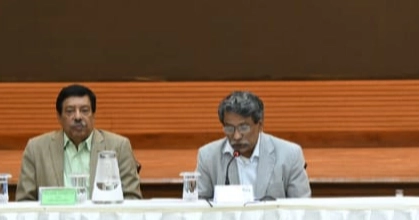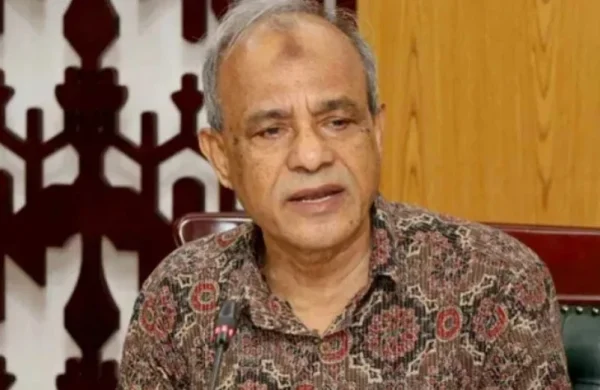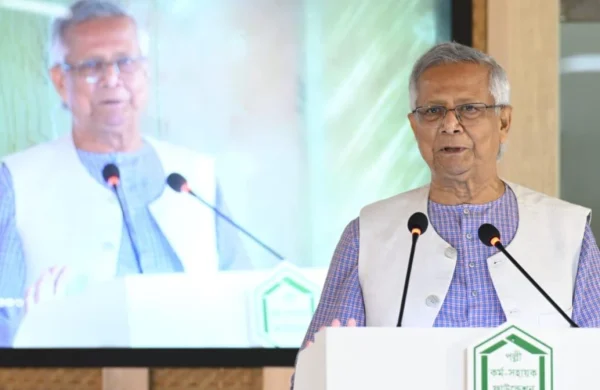Tulip considers herself ‘collateral damage’ in Bangladesh graft trial
- Update Time : Sunday, August 10, 2025

TDS Desk:
“I looked it up myself – there’s no extradition treaty,” says Tulip Siddiq, the MP for Hampstead and Highgate and former Treasury minister, who resigned in January after a political storm engulfed her.
Just over a week ago, Siddiq, 42, a close ally of Prime Minister Keir Starmer, learned through a journalist who contacted her lawyer that she had been formally indicted in Bangladesh on corruption charges.
She is accused of using her influence as the niece of Sheikh Hasina, the ousted former prime minister of Bangladesh, to secure a plot of land in Purbachal, Dhaka, for her mother, brother, and sister. “It’s completely absurd,” Siddiq says in her first interview with The Guardian’s chief reporter Daniel Boffey on Sunday since the charges emerged.
A trial date has been set for August 11, involving Siddiq and more than 20 others. But with no formal summons yet received, she is left in legal limbo. “I’m taking advice from Hugo Keith KC, who’s guiding me on my next steps,” she says. “I still haven’t seen an official notice. I’m supposedly days away from a high-profile trial in a foreign country, and I genuinely don’t know what the specific allegations are. It feels like a Kafkaesque nightmare.”
Bangladeshi authorities have confirmed they will proceed with the trial in absentia if necessary. While the UK and Bangladesh currently have no extradition treaty, a conviction could test the boundaries of diplomatic and legal cooperation between the two nations.
For a brief period last year, after Labour’s victory in the July general election, Siddiq was at the height of her political career. Appointed by Starmer, whose constituency borders her own, as Economic Secretary to the Treasury and City Minister, she threw herself into a major review of financial services. “I loved it,” she says. “And I was good at it.”
Meanwhile, 5,000 miles away, her aunt’s 15-year rule was collapsing under the weight of student-led protests. After widespread unrest and the deaths of hundreds, possibly thousands, of demonstrators protesting what they described as an increasingly autocratic regime, Hasina and Siddiq’s mother, Sheikh Rehana, fled Dhaka in a military helicopter to India.
Siddiq admits it was a terrifying time. Her family has long been marked by tragedy: during the August 15, 1975 coup d’état, her grandfather, Sheikh Mujibur Rahman, Bangladesh’s founding president, was assassinated along with most of his family.
But in the summer of 2025, life for Siddiq, her husband Chris Percy (a strategic consultant), and their two children continued relatively normally – until a new government took power in Dhaka under Dr Muhammad Yunus, the Nobel laureate economist and long-time political rival of Hasina.
It was then that what Siddiq calls the “dirty politics” of Bangladesh began to unravel her life.
Obscure websites began publishing allegations that she had embezzled $5 billion from a deal between her aunt’s government and a Russian firm to build the Rooppur nuclear power plant. A 2013 photo of a smiling Siddiq with Hasina and Vladimir Putin in Moscow was recirculated as “evidence” of improper ties.
“My aunt was on a state visit,” Siddiq explains. “My sister and I travelled from London just to see her. We were sightseeing – dining, shopping. On the last day, families of the delegation were invited to a reception. I met Putin for two minutes. That’s it.”
Another story claimed she had been gifted a flat in King’s Cross in 2004 by an associate of the Awami League. In reality, the flat belonged to her godfather, a non-political figure who, she says, “much to my dismay, has never even voted.”
The complication arose because two years earlier, she had mistakenly told a newspaper that her parents had bought the property for her – a misstatement rooted in her elderly parents’ fading memories and their long-ago separation.
Further scrutiny followed over her living in a house owned by a Bangladeshi-heritage property developer, despite owning a home in Cricklewood. Siddiq says she moved due to a security threat: a man facing terrorism charges claimed she was responsible for his situation. With the murder of Tory MP David Amess still fresh, she was advised to relocate urgently. She says she has been paying full market rent.
As allegations mounted, many originating from Bangladeshi authorities, Siddiq referred herself to Sir Laurie Magnus, the Independent Adviser on Ministers’ Interests. After two weeks of intense scrutiny, Magnus cleared her of breaching the ministerial code, though he noted it was “regrettable” she hadn’t been more alert to reputational risks arising from her family ties.
“That line really frustrates me,” Siddiq says. “I can’t help who my aunt is. It’s like saying I should have been more careful about how I was born.”
She resigned to prevent the controversy from distracting the government, despite Starmer’s support. “He told me I could return one day,” she says. “He even joked: ‘In the previous administration, people who broke the code stayed on. You know that, right?’”
But the allegations have not stopped. Her lawyers’ attempts to obtain clarity from Bangladeshi authorities have been ignored.
Meanwhile, evidence compiled by lawyers at Doughty Street Chambers for the International Criminal Court suggests that the post-Hasina era has not brought the promised reforms. Reports include “unprovoked and violent attacks” against journalists, police, minorities, and those linked to the Awami League.
Siddiq attempted to meet Yunus during his UK visit earlier this year, but he declined, citing concerns over judicial impartiality.
In a separate development, the UK’s Serious and Organised Crime Agency (SOCA) has frozen nearly £90 million worth of London properties linked to individuals associated with Hasina – including one where Siddiq’s mother lived and still keeps personal belongings. Siddiq insists she has no connection to the property.
“The truth is that I’m collateral damage, because of this feud between Muhammad Yunus and my aunt,” she says. “These are wider forces that I’m battling against … There’s no doubt people have done wrong things in Bangladesh, and they should be punished for it. It’s just I’m not one of them.”
















